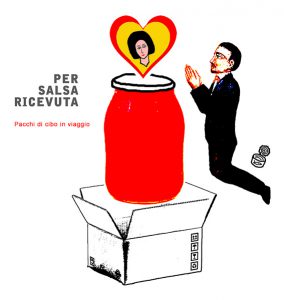Per Salsa Ricevuta. Traveling Packages of Food
An Ethno-Artistic Installation

Concept
The practice of sending food to migrated children, students or workers, is widespread in South Italy.
The food contained in the box takes different meanings for the person who prepares it and for the person who receive it.
Food sent by one’s parent recalls the family origins and the sensescape of the place of origin: the smells of home cooking, the dishes, the sound of the local dialect, the mother’s and grandmother’s presence in the kitchen, their way of doing things, and the occasions of festive commensality.
The food has a strong power in activating sensorial memory thanks to the direct contact with the body of the person who is eating it. Eating specific foods means focusing on the the relations with places and persons which are literally embodied and re-lived.
Thanks to this power, the parents take control of children’s body, of their health and keep their bond with the family alive.
All Local Stuff
Whoever sends a package often owns a vegetable garden.The raw food contained in the package is connected to the memory of the male side of the family, to those fathers and grand-fathers who take care of the garden from which vegetables and legumes grow. So the food coming from the vegetable gardens have an important role in the sensorial landscape of the home.
The care of the vegetable gardens expresses not only the culture of wanting to save and of the importance of genuine food, but it also represents
a tradition through which the males of the family, taking care of their vegetable gardens keep the memory of their ancestors alive, confirming and preserving their peasant identity.
Saving Money
Parents claim that they send local food or home-made from home to save money, both for them and their children, considering the high cost of living in Northern cities.
Saving and re-cycling are important values in peasant culture that reminds their children of their family origins. But if we consider the costs of shipping products and the cost of the products themselves, there is no real savings.
So the rethoric of saving seems to be hiding a more important aim: to keep control and take care of a sentimental bond with their family, causing a form of nostalgia that ties the child with the mother forever.
Care and Control
The food sent from the parents allows children to construct a sense of home, to activate the memory of the place of origin, to strengthen
the relations with other migrated countrymen, to express their southern identity.
At the same time, the food received can start a conflict with the student’s new urban identity.
On the other hand, the shipment of food enables the mother to keep her role of woman, and to mantain control on her children’s life. Filling their pantry is a way to control their diet and also to make them feel at home.





